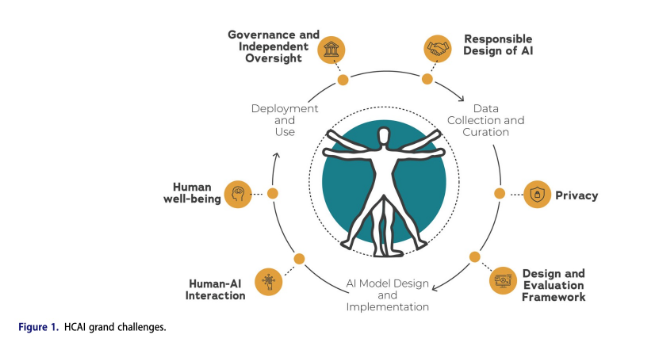Join us for this Online Workshops Series on the 6 Grand Challenges of Human Centered Artificial Intelligence
From Hyperbole & Hysteria 2 Knowledge & Curiosity: The Six Grand Challenges of Human Centered Artificial Intelligence (6GC–HCAI)

Key Questions:
- What are the Six Grand Challenges of Human Centered Artificial Intelligence (6CG–HCAI)?
- How did we develop them?
- What are their implications?
- What do we do now (research and action fueled by knowledge & curiosity)?
What:
- A Series of 3 Online Workshops on the 6 Grand Challenges of Human Centered Artificial Intelligence (6CG–HCAI) on Zoom
- Three Workshops will be conducted on:
- Monday, 08 April 2024
- Friday, 17 May 2024
- Monday 03 June 2024
- At 10 to 11:30 AM Pacific Daylight Time; 1 to 2:30 PM Eastern Daylight Time
Format for Workshop #1:
- Tell the 6GC-HCAI Development Story (Why? What? How?)
- Explain the 6GC–HCAI
- Engage with participants about the 6GC–HCAI:
- What are the implications of the 6GC – HCAI model?
- How do we apply the 6GC – HCAI Model in the real world of organizations?
- How does it application vary by industry and society sector?
The Substance of Workshop #1:
- This is an overview workshop to tell the story creation of the Six Grand Challenges Paper and the cross-disciplinary collaborative research and deliberations that led to the paper.
- The paper describes a condensed set of six major areas in the life cycle of AI design and implementation and calls for research and action by a variety of stakeholders, including business leaders and policy makers to create viable human center artificial intelligence supertools.
- Engage with participants about the 6GC–HCAI and their implications in various sectors of organizations in our society for both our research and action.
The Substance of Workshops #2 & #3:
- Engage with participants about the 6GC–HCAI and their implications in various sectors of organizations in our society for both our research and action.
Workshop Presenters & Facilitators:
Dr. Özlem Garibay has over 20 years of combined experience in creating and developing multimillion-dollar complex software systems and research in artificial intelligence. She is an assistant professor in industrial engineering and director of the UCF Human-Centered AI Research Laboratory, a cross disciplinary team dedicated to investigating artificial intelligence from a human-centered context. Prior to that, she served as the director of the UCF’s Research Technology Office. Her areas of research are applied machine learning in drug discovery and molecule design, social media analysis, social cybersecurity, social and economic networks, network science, and evolutionary computation. Dr. Garibay received her MS and PhD in Computer Science from the University of Central Florida in 2001 and 2008 respectively and her BS degree in Electrical and Electronics Engineering from the Middle East Technical University in Turkey.
Dr. Brent Winslow, Staff Research Scientist at Google, has over 15 years of experience in integrating humans and technology, including leveraging real-time sensor data and AI algorithms to improve health, learning, and work. He has been awarded over 20 federal grants and contracts to support his research and led a number of highly collaborative efforts across business, academia, and government to integrate sensors and algorithms into daily life. He is a strong scientific communicator with over 70 publications, patents, and presentations. Prior to joining Google, Brent was Chief Scientist at Design Interactive, and performed post-doctoral work at the Allen Institute for Brain Science, leading the development of the first mammalian connectome. Dr. Winslow received his PhD in Bioengineering from the University of Utah in 2010.
Bert Painter is an independent consulting social scientist and documentary filmmaker. Since 1975, his professional passion has been to assist people in designing their work and organizations to achieve both high performance and quality in their working lives. As a filmmaker, Bert has produced over 20 documentaries on innovative workplaces in North America.
Current projects involve work with engineers, IT professionals, and employees to deploy advanced technology in manufacturing in ways that up-skill (vs. displace) the workforce, as well as work with staff and management to design effective and flexible hybrid office work. Bert is also serving as President of the STS Roundtable.
He has a B.A. from Carleton University (Ottawa) and an M.A. from the University of Sussex, U.K.
Peter Jay Sorenson is a freelance designer of teams, organizations, systems, networks, and ecosystems. He has been doing this for a long time and he is still trying to figure things out. He has curiosity, a sense of adventure, a penchant for experimentation and innovation, as well as a sense of humor. He listens well.
He is searching for the next generations of ideas that can be used to design the gaggles of human beings doing work in the digitally fueled, messy context that is the future of our local, national, and global societies. He works to develop the next generations of humans to do that work. He looks for signals that come from on and over the horizon that can give us clues about what comes next and what will work.
He has a BA from The University of Washington and an MA from The Brigham Young University.
Attached you will find a relevant article that will provide more information.

